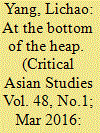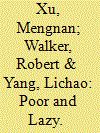| Srl | Item |
| 1 |
ID:
143667


|
|
|
|
|
| Summary/Abstract |
This article explores the health, disease and socioeconomic circumstances of garbage collectors in Guiyang, southwestern China. It aims to contribute to medical anthropology and understandings of Chinese society by examining garbage collectors’ understandings of waste picking, pollution and the health risks and diseases associated with their struggles for survival at the “bottom of the heap” of peri-urban society in contemporary China. Drawing on one month of ethnographic fieldwork, it provides new insights into the oft-neglected subjectivity of individuals struggling for survival at the margins of Chinese society, and how this subjectivity is shaped by their structural position as well as by their own agency in making sense and making the best of their lives.
|
|
|
|
|
|
|
|
|
|
|
|
|
|
|
|
| 2 |
ID:
186727


|
|
|
|
|
| Summary/Abstract |
Now addressing relative not absolute poverty, China must redistribute income from the middle class to persons experiencing poverty. However, policy rhetoric has recently prioritised laziness as causing poverty, a view widely shared by China’s middle class. Employing a convenience sample of 2,449 middle-class respondents, regressions relate the attribution of poverty to personality, and ideological and individual socialisation. Given two choices, most respondents chose laziness over unfairness but, with more choice, selected ‘modern progress’. Respondents prioritising laziness exhibited extravert and authoritarian personality traits and more faith than others in government policies. They were less well educated and unlikely to have studied social sciences. Respondents subsequently attributing poverty to modern progress had similar characteristics but were not extravert. Building support for redistributive policies could therefore prove difficult.
|
|
|
|
|
|
|
|
|
|
|
|
|
|
|
|